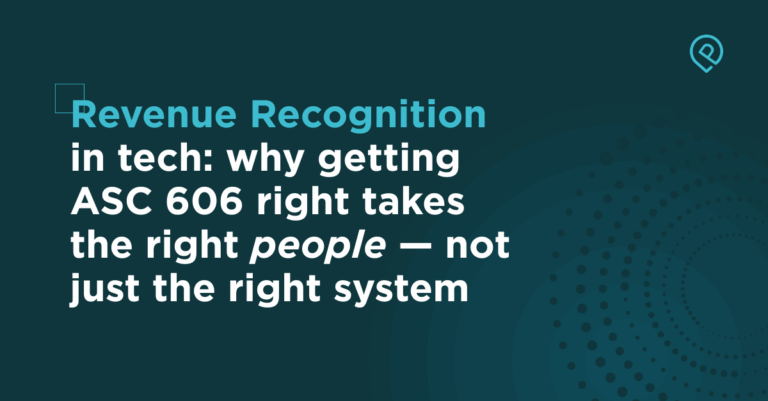By Michael Breslin, Landing Point Co-Founder
If you’re leading finance at a growing software company, you already know that revenue recognition isn’t just a box to check. It touches almost everything: sales strategy, customer contracts, audit readiness, and even the story you’re telling your board or investors.
And yet, we continue to see RevRec treated as a back-office technicality—something to be managed off the side of a desk, often by an overstretched Controller or an external consultant brought in after problems arise.
The truth is: ASC 606 is complex. And for software companies juggling usage-based pricing, long-term contracts, and ongoing system migrations (hello NetSuite), ignoring it until year-end is a risky move.
Here’s how to think more strategically about the people who can help, and why the right hire might not come from where you expect.
The Common RevRec Pain Points We Hear
- “Our audit took way longer than it should’ve.”
Often caused by inconsistent revenue treatment across contract types or missing documentation trails. - “We had to delay our reporting because we didn’t trust the numbers.”
Data integrity issues due to clunky integrations between CRM, ERP, and billing tools. - “Our new pricing model threw a wrench into everything.”
Product and go-to-market shifts without upfront accounting input = downstream chaos. - “We don’t have anyone who truly owns revenue.”
Responsibility is split across too many people, and no one has the technical depth or time to dive in.
What Kind of Talent Can Solve This?
There’s no one-size-fits-all answer. But here are three profiles that have helped our software clients clean up their revenue processes and gain confidence with auditors and stakeholders:
#1: Technical Revenue Accountant (CPA with ASC 606 depth)
Often trained in public accounting and battle-tested through client audits, these professionals:
- Know how to build or refine revenue memos
- Speak fluently with external auditors
- Can work across departments to improve policy adherence
They bring structure to ambiguity and are often the glue between accounting, FP&A, and legal.
#2: RevRec Lead with System Implementation Experience
If your company is moving to NetSuite or upgrading billing software, this is your game-changer.
Look for candidates who have:
- Led or contributed to an ERP implementation
- Scoped RevRec automation rules
- Worked closely with vendors or consultants to test and validate revenue schedules
They often have hybrid finance/ops backgrounds and make great internal project owners.
#3: The Non-Obvious Hire from Outside Software
This is where we encourage clients to not be myopic.
Your next RevRec star might be:
- A CPA at a biotech company that sells lab access as a service
- A revenue analyst from a telco with usage-based billing models
- Someone in media or streaming where bundled pricing and deferred revenue are the norm
What matters most is how they think, not just where they’ve worked. Someone from a different industry might see around corners and bring valuable perspective your team lacks.
Our Advice: Don’t Wait Until It’s a Problem
Too often, companies call us after the damage is done—an audit didn’t go well, a Board meeting raised red flags, or a key RevRec hire left mid-close.
We recommend:
- Auditing your current process before the auditors do
- Thinking about RevRec talent as part of your system strategy
- Considering contract complexity and pricing innovation as key hiring drivers
At Landing Point, we specialize in helping growth-stage companies hire the right finance talent to get ahead of RevRec complexity—not just react to it. Whether you’re preparing for an audit, scaling pricing models, or just tired of Excel gymnastics, we can help you think more strategically about the team you need.
Sometimes the best solution is the one you didn’t know to ask for.
About Michael Breslin
Michael J. Breslin is a Co-Founder of Landing Point and leads the firm’s Boston office. With more than two decades of experience in executive search and finance leadership recruiting, he specializes in connecting accounting and finance professionals with opportunities in asset management, private equity, hedge funds, and software companies.
Michael’s work spans CFO, controller, and finance operations roles for mid-market and institutional investment firms throughout the Boston and Tri-State areas. Notable searches include the Global Controller for a multi-strategy investment platform and the Controller of a Boston-based global SaaS company.
Before founding Landing Point, Michael spent over a decade recruiting and three years with KPMG—an experience that provides the technical grounding and advisor credibility that clients trust. He holds a BA in Accounting from Fordham University, where he competed on the Division I swimming team. A Boston-based golfer, drummer, and youth soccer coach, Michael brings team focus and precision to every engagement.

